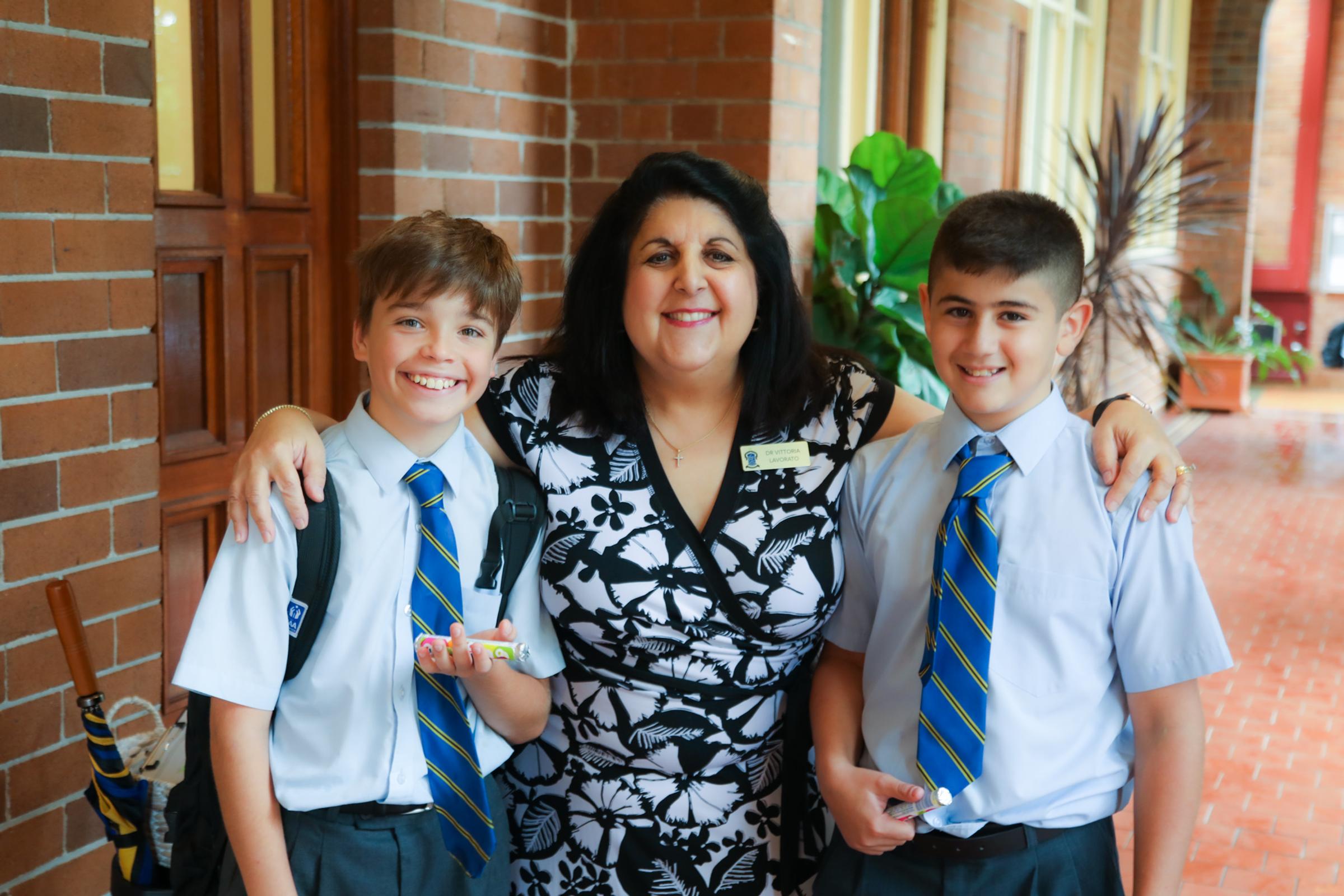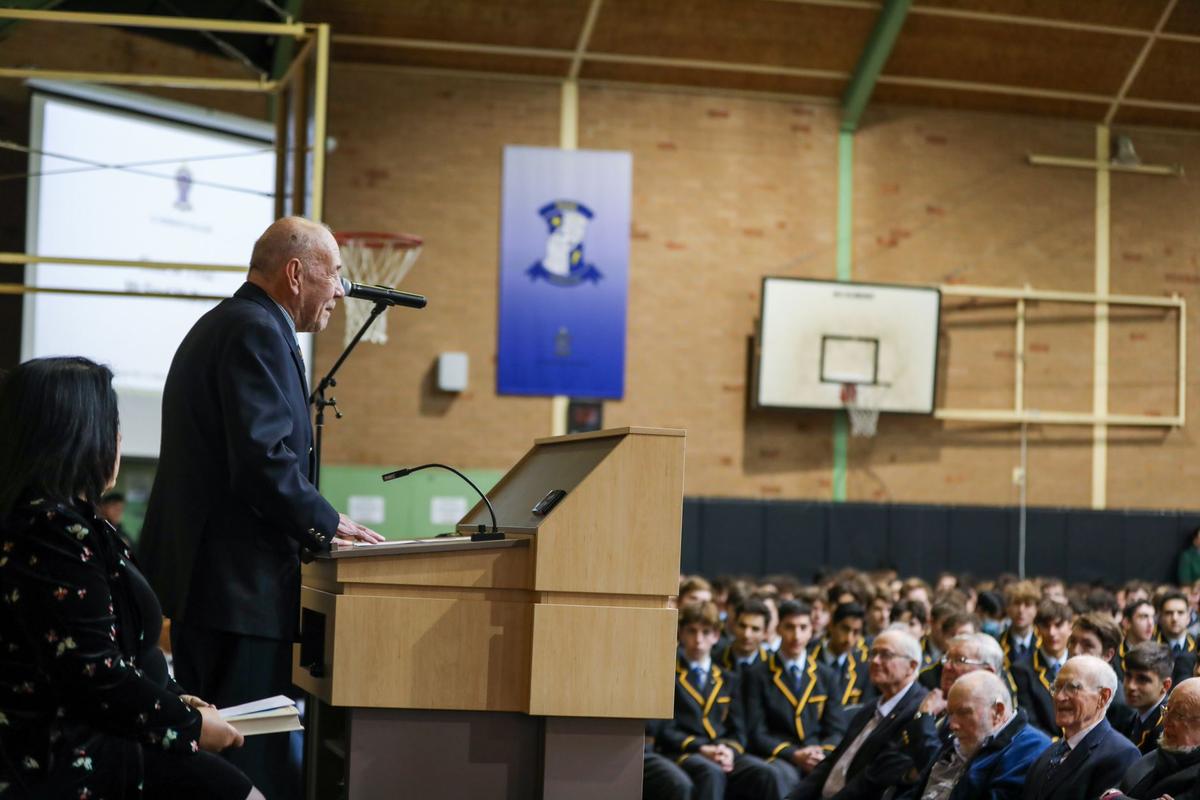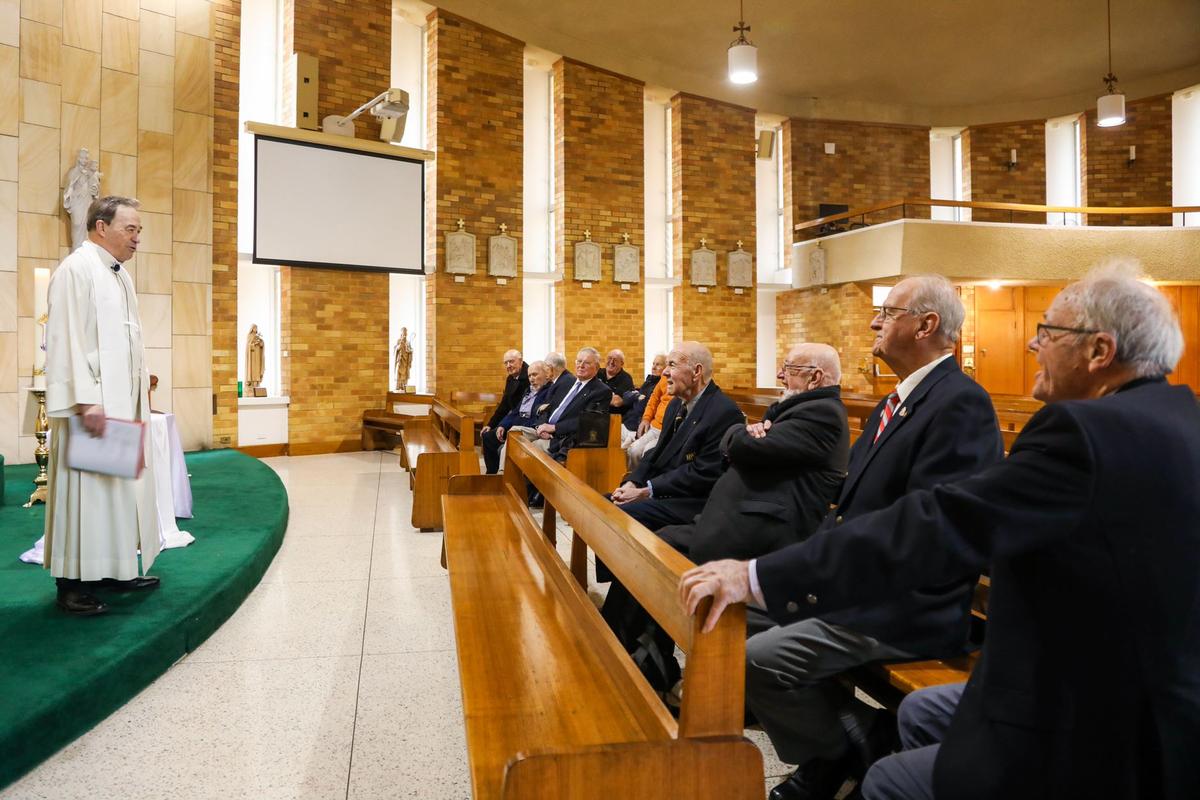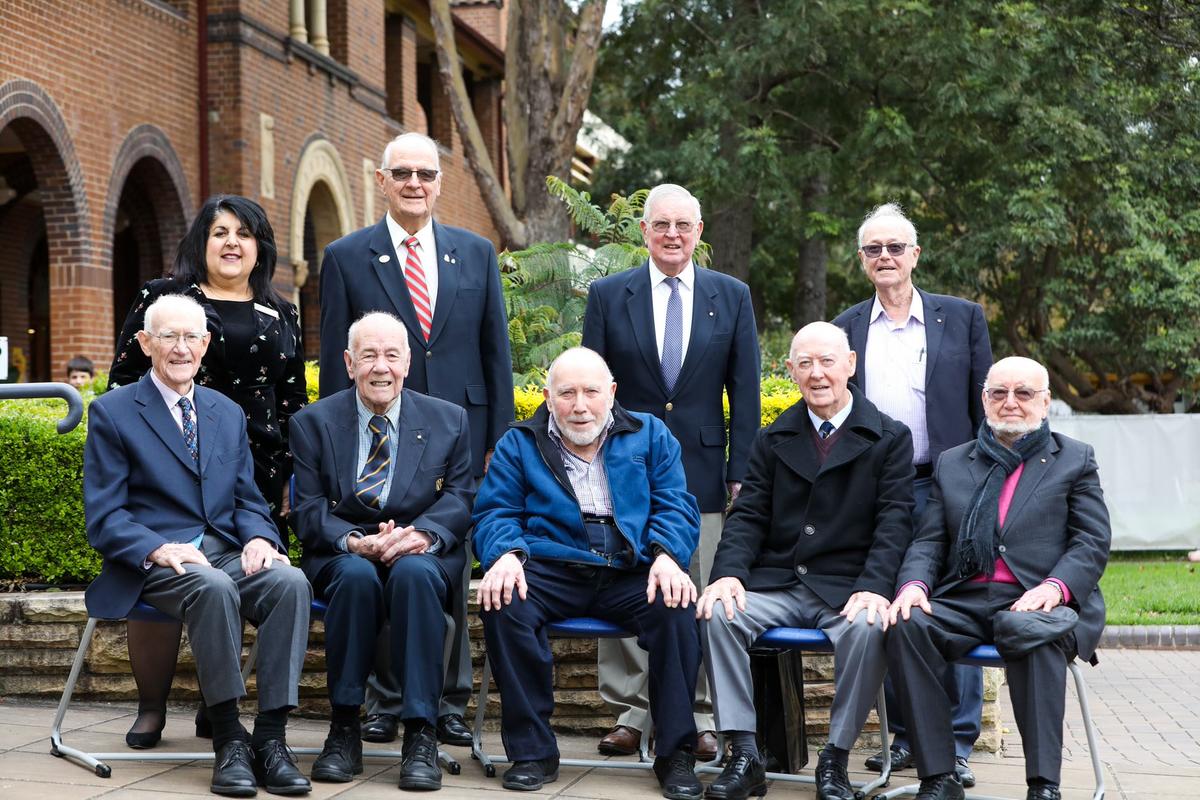Principal

Founder’s Day and the importance of valuing our history
This Friday 10 June 2022, we celebrate our annual Founder’s Day at St Patrick’s College, Strathfield. For me – for us all – it is arguably the most important day in the College’s calendar: a day when we remember the founder of the Edmund Rice tradition, Blessed Edmund himself, his Christian Brothers and value their legacy. We are indebted to the men and lay people who had the vision that led to the creation of the College back in 1928, and who have contributed to the leadership and vision of the College since. None of the education for which the College has become known would have happened without the foresight of the original Christian Brothers who set out from Ireland to provide a quality education for boys. In our case, they set out with the express intention of developing a college which provided an excellent education for boys. We owe them a debt of gratitude – without them this fine school simply would not exist – and this is why we honour Blessed Edmund and the Christian Brothers on Founder’s Day each year.
The day is a very full one with a mass, concert, a special barbeque lunch and then the running of the Waterford Mile. Whatever the weather, the day is normally an amazing one. It is an opportunity for all of us to take visible, obvious pride in the College. Moreover, we allow all of those connected with the College to feel the privilege that we feel to be part of this great school.
I remind the boys again that we should never take Founder’s Day for granted or see it as just simply another school event. Founder’s Day is extremely important for the school for two reasons: firstly, it is a day on which we celebrate achievement – our many achievements, individual and collective; second, it is an important occasion for the whole school to be together, to do things together, and to remember that we are an important and strong community – the whole is stronger than the sum of its parts. In the Founder’s Day Mass, the whole school worships together and makes a commitment to do the right thing, to be honourable and to carry out the intentions of our founder, namely, to respond to their goals for a real education, for the stretching of the individual, and for learning and preparation for a successful life. We say all that together because it is important to say it all together. We need this occasion in the year just to remind us that we do not work, or live or play in isolation. We do it as a College – a great College which has stood the test of time and which has a great, great history.
I am looking forward to Friday! Luceat Lux Vestra.
Edmund's Values (by Regis Hickey)
In preparing a homily for Founder’s Day in Boondall, this writer focused on the values which were evident in Edmund’s life, putting down his points in the order in which they are given below. He did not realise until afterwards that he was “touching into something of considerable significance”, which he unveils at the end.
Relationship with God
The first value by which Blessed Edmund lived was his relationship with God. Keeping it alive was something he worked at, living the Brothers’ rule which he wrote… “The Brothers shall consider prayer to be the foremost of their daily duties and the means by which they bring down on the Brothers and on their students the blessing of God.” The best way of understanding this is to think of a good marriage. Strengthening the relationship is the highest priority. The relationship with God is founded on trust. Trust has been described as the womb where love is born, a beautiful phrase. Edmund’s trust in God was severely tested at various times in his life. To name three: the death in childbirth of his wife; the outlawing of his Institute by the British Government in 1829; and the problems caused by some Brothers who tried to sideline Edmund so that they could lead the Congregation. The more he was tested, the stronger was his trust. He faced life without anger, his trust in God rock-solid.
Apostolic spirit
His second value was his apostolic spirit, his desire to spread the Kingdom of God. A good friend of his, Stephen Curtis, a barrister in Waterford, said of him, “Edmund Rice looked beyond this world.… He wished men charitable, he wished them just, he wished them meek, he wished them godly. Affluent and free he wished them too, provided that this freedom was based on virtue.”
The will of God
Concern for the will of God was his third value. His favourite quotation, expressing a lifetime of experience and acceptance, was this verse from Job, “The Lord gave; the Lord hath taken away. As it hath pleased the Lord, so be it done; blessed be the name of the Lord.” In his old age he remarked to the young Brother who attended him, “Pray, Brother Stephen, that the will of God be done in me.” And to a Sister whom he was advising on a business matter he wrote, “Let us wait on God’s time.”
The above-mentioned three values relate to God. However, we know that there is a second commandment, love of neighbour. This leads to our fourth value.
A generous provider
Edmund was a generous provider. He gave of his substance to relieve those in need. Beside his school in Waterford, he built a bakery and a tailor shop. Those who knew him in Waterford described him as “father and mother to the poor.” When an investment he had made for the education of the daughter of one of his friends failed, he continued to provide the funds from his own purse. And we have his generous words, “Were we to know the merit and value of only going from one street to another to help a neighbour for the love of God, we should prize it more than silver or gold.”
Forgiveness
Edmund was forgiving, a fifth value. Good man as he was, he had enemies, a few of them among the Brothers, who thought they could run the Congregation better than he. When one of them who gave Edmund endless trouble became very unwell, Edmund arranged for him to take a holiday in France to restore his health. He also wrote, “Human beings are frequently ungrateful and forgetful of favours done them but let us do ever so little for God we can be certain that he will not forget it or let it pass without its reward.”
Integrity
And his sixth value: integrity and purity of conscience. During a business deal, a bank manager tried to tell him that he could save money by taking a dubious shortcut. Edmund was indignant. Normally restrained, he hit the table with force, declaring “I will pay what is just.” And in the Rule which he wrote for the Brothers, he emphasised the importance of preserving the innocence of the children who had the Holy Spirit dwelling within them.
It was only after he had written the above that he realised that the six points listed, as well as the order in which they are listed, was really the prayer composed by Jesus, the Our Father. To make this more obvious, compare Edmund’s values as named above, with the parts of the Our Father to which they correspond…
| Edmund | Jesus |
|---|---|
| Edmund’s relationship with God | Our Father, who art in heaven, hallowed be thy name |
| His desire to spread the Kingdom of God | Thy kingdom come |
| The will of God | Thy will be done on earth as it is in Heaven |
| A generous provider | Give us this day our daily bread |
| Forgiving against us | And forgive us our trespasses as we forgive those who trespass |
| Integrity and purity of conscience | And lead us not into temptation but deliver us from evil. Amen. |
You can see how closely Edmund modelled his life on Jesus. That was his wisdom. As we say the Our Father together at Mass, let us keep in mind that Edmund lived the prayer that Jesus gave us.
7O-Year Reunion of the Class of 1952: Our very own Platinum Jubilee
Last Friday 3 June 2022, our College Assembly was dedicated to honouring members of the Class of 1952 who came to the assembly and then attended a special mass and luncheon.
Our special guests were: Terry Chadwick, Paul Crittenden, John Donnelly, Paul Grew, Denis Kearney, Thomas Kenneally, Fred McDonald and John Roddy.
A couple of these Old Boys have descendants at the College right now:
- Thomas Kenneally has a grandson, Gus Cockerell (Year 9)
- Fred McDonald has five grandsons here, Oliver Sproule and Ashton McDonald (Year 5), Patrick McDonald (Year 6), Taj McDonald (Year 8) and Jack McDonald (Year 8).
I shared with the boys the information I gleaned about this cohort from past Lumens, and it would be fair to say that this cohort was a special one that really enjoyed its time at St Patrick’s.
- In Fourth Grade their master noted that “Fred McDonald has great prospects of being a member of the demolition squad. He is practising at the altar and the desks in our classroom.”
- When they were in Fifth Grade, their teacher noted that “Unfortunately a few boys in the class do not carry out the required study and allow other boys to beat them in the race of schooling”. However, he noted” The boys in this class beat all others in the race to the tuckshop where their kind fairy godmother, Mrs Whyform, attends to their daily requirements.”
- Things didn’t improve with their application to study in Sixth Grade! “Peter Garard, Keiran Williams, Fred McDonald, Brian Metz and John Charlton have decided to be members of parliament because they are always involved in daily talking practice”.
- By high school, things had improved but food was still a feature. They all took hikes around Sydney (Waterfall to the Royal National Park), Berowra to Turramurra. Their teacher lamented “If only we could arrange hikes for mothers too. The cooking of McGoldrick, Smith and McDonald: if anyone saw their cooking, they could do without it!”
There are things that have not changed 70 years on:
- Boys still love to eat and the race to the canteen is still one that is astonishing.
- Boys still like to talk in class.
- Boys at SPC love their school and love to participate in all that it offers.
- Boys at SPC are inclusive. Like your cohort, they come from so many different family backgrounds, different socioeconomic circumstance, and travel to get here. All are welcome here.
- Boys at SPC are faith filled and like the Class of 1952, when they return for their 70-year reunion (Year 12, that will be in 2092!) I pray that they will still celebrate with Mass and share the Eucharist together.
- Boys at SPC love their families and we hope that like them, their descendants will also join the SPC community.
To finish up the assembly, all the students were upstanding, and Charlie Dening and Owen Toogood led the entire group in a rousing War Cry. Our Class of 1952 then left to the rhythm of our Drum Line. We may not have had the special jets do a fly-over like Queen Elizabeth II, but the drum line and the authentic applause certainly made it a wonderful “Platinum Jubilee celebration”. It was a most special moment that will forever linger in my memory.
Dr Vittoria Lavorato
Principal
SPC boys can do anything!
**except divide by zero



